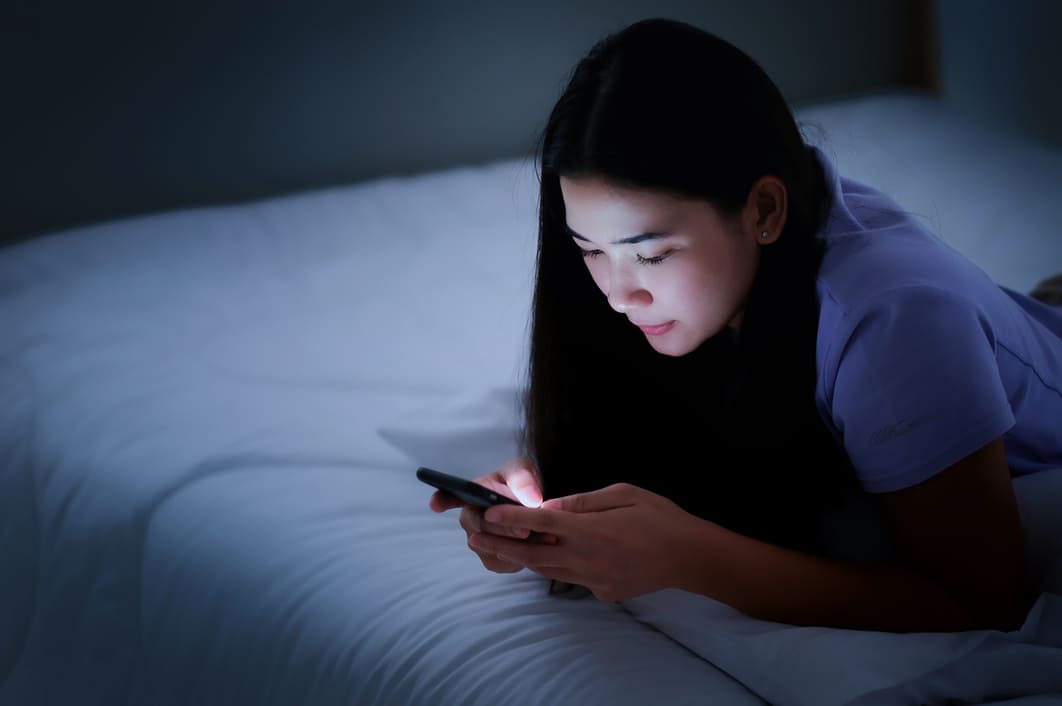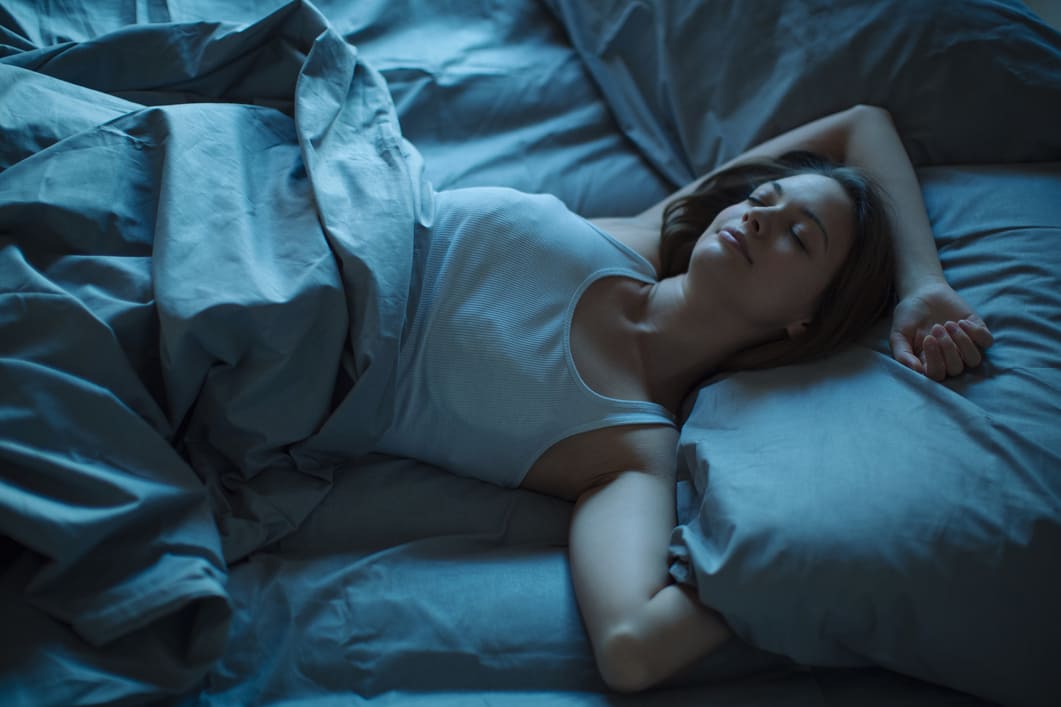
Many of us are guilty of using technology such as laptops and mobile phones in our bedrooms at all hours. Whether it’s catching up on work, watching Netflix, or even gaming, screen time is often a way for us to unwind before turning in for the night. In fact, 90% of Americans report using an electronic device in their bedroom within an hour of trying to fall asleep. Similar statistics apply in many countries that have widespread access to technology. However, emerging research indicates that this could prove damaging to our health in the long run. This article explains what blue light is, why we should be banning it from our bedrooms, and what we can do to ensure a restful night.
What Is Blue Light?
So, what exactly is this infamous blue light? Well, blue light is one of the colours in the visible light spectrum. The other colours are red, orange, yellow, green, indigo, and violet. Each colour has a different energy level and wavelength. Blue light has higher energy and shorter wavelengths than other colours. Artificial blue light is emitted from many digital devices that you find around your home. There is limited evidence to suggest that blue light can have a positive effect on us in some circumstances. Some people have claimed that it can potentially influence alertness, assist memory, improve your mood and even increase your reaction times. However, blue light may have a dark side when it comes to our health and wellbeing (when we’re trying to sleep).
What Gives Off Blue Light?
Chances are, the device you are using to read this article is on this list! Some of the most popular sources of blue light include:
- The sun (which emits natural blue light during normal daylight hours)
- Digital screens (e.g. TV sets, laptops, smartphones, and similar devices)
- Fluorescent lighting
- LED lighting
- Other electronic gadgets
It turns out that blue light can come from objects all over the modern home, and you are probably using more than one even as you read this. So, what should motivate us to banish these sources from our bedrooms when we’re trying to rest? Let’s shed some light on three surprising reasons.
Reason 1: Blue Light Exposure May Cause Eye Damage
Let’s start with perhaps the least surprising side effect of blue light sources. It probably isn’t a great shock to hear that using brightly lit devices before sleep – and especially in a dark room – is not great for our eyes. But what is disturbing is just how damaging this can prove to be for us. Further research is needed in order for us to understand the long-term effects fully. Current research, however, presents worrying reading.
It has been suggested that high-energy light may possibly increase our risk of developing eye diseases. Some research indicates that there might be a connection between eye problems and short-wave blue light (with wavelengths of up to 450 nanometres). Most of the LEDs used in smartphones, TVs, and other devices emit light that falls within these hazardous wavelengths.
Furthermore, experts claim that digital eye strain (or computer vision syndrome) affects about 50% of computer users. Some common symptoms of this issue can include itchy, dry, and tired eyes that may in some cases trigger other problems – such as headaches.
It, therefore, appears as though we are damaging our eye health when we are exposed to too much blue light. However, we will not know how serious the potential risks are until more long-term research has been conducted.
Reason 2: Blue Light Can Disrupt Our Sleep Cycles
Our bodies have an internal clock that regulates our ‘circadian rhythm’ (the 24-hour biological cycle that affects many internal functions). This rhythm decides when our bodies are feeling awake and ready for the day, but it needs some help. Our body clock looks for signals in the external environment to determine how alert we should be. During the day, the sunlight and white light we are exposed to contain a lot of blue light. This is fantastic, as this blue light helps us stay alert, reduces fatigue, and improves our general mood.
However, using electronic devices and modern light bulbs that emit blue light continuously can disrupt our internal clock (particularly during the evening). When it gets dark outside, our body naturally secretes the hormone melatonin. This hormone tells our system to wind down and get ready for bed. Worryingly, blue light inhibits the production of melatonin which, in turn, can reduce the amount of sleep you get. In a way, artificial blue light tricks our brains into thinking it is still daytime. Disturbingly, long-term melatonin suppression in the evening has been linked to a myriad of health problems. These issues may potentially include metabolic syndrome, obesity, and even depression.

Reason 3: Potential Links With Serious Illnesses
Coming into contact with too much blue light at night may possibly impact your risk of developing serious illnesses such as cancer. More research is needed since the long-term effects remain to be seen, but studies are contemplating the possibility that late-night blue light exposure might be a contributing factor to breast and prostate cancer in some people. These emerging studies have mainly focussed on people working night shifts. No matter how small, any risk of cancer should make us stop and seriously think about the repercussions of blue light (or any other poor lifestyle habits that are within our power to change).
What’s The Solution?
Now that we know that encountering too much blue light at night can potentially be very damaging to our overall health, what practical steps can we take to protect ourselves as much as possible? Of course, we can pledge to turn off our devices once it gets dark and to lower our overall usage, but this does seem a bit far-fetched in the tempting age of technology. It may not always be possible for those of us who work in the digital sector.
There have been several interesting ideas on how we can protect ourselves from excess blue light. For example, you could purchase computer glasses. These glasses deliberately have yellow-tinted lenses to stop some of the harmful effects of blue light from impacting your eyes. Another way to limit exposure is to install a screen filter that absorbs most of the blue light that is emitted by your device. A third way (and possibly the most challenging to implement) is to be more sensible with your screen time. You could start by giving yourself adequate breaks to rest your eyes – therefore limiting the amount of artificial blue light you are encountering. Alternatively, something as simple as a daily supplement may help to safeguard your sleep habits (and it certainly requires much less effort).
Here at Yawns, we like to keep a bright outlook where sleep is concerned – which is why we’ve developed a new, all-natural supplement designed to inspire your nighttime ritual. Our exclusive sleeping capsules (aka. Night Caps) might just earn a permanent spot on your bedside table – since they are specially crafted to help your mind and body switch off each night. Our product is unique because the formula is sourced directly from nature and features a wide range of exotic, plant-sourced extracts. Each ingredient has been carefully selected due to its potentially beneficial qualities. To learn what you can expect to find locked in each capsule, keep reading:
- Ashwagandha powder: A herb that may help you to manage stress symptoms, influence your natural hormone levels, and potentially impact blood sugar levels. Furthermore, this plant has been traditionally linked with easing some mental health symptoms. It might even influence some signs of inflammation and cholesterol and impact your natural brain function.
- Valerian root powder: This plant is anecdotally known to help improve your sleep and reduce some anxiety symptoms.
- Griffonia seed extract: These seeds may potentially aid weight loss efforts and impact serotonin levels (a hormone that naturally helps us to feel good). Also, it may potentially reduce migraine frequency and help you to sleep more peacefully!
- Black pepper powder: This classic and universal spice is high in antioxidants and also has some anti-inflammatory properties. It might just be one of the most underrated spices in your kitchen as far as wellbeing is concerned.
The Future Of Organic Sleep Supplements Is Bright
This article has demonstrated the potentially harmful effects of using devices that emit blue light when it is dark. Many worrying links have been made between this light and various wellbeing challenges – including eye problems and sleep issues. To remain as healthy as possible, we must ensure we get the rest that our body needs and switch off successfully each night. Night Caps may help you as you take active measures to unwind. They’re also an excellent opportunity to sample a diverse range of plant extracts all in one go. Are you ready to reclaim your nighttime routine?